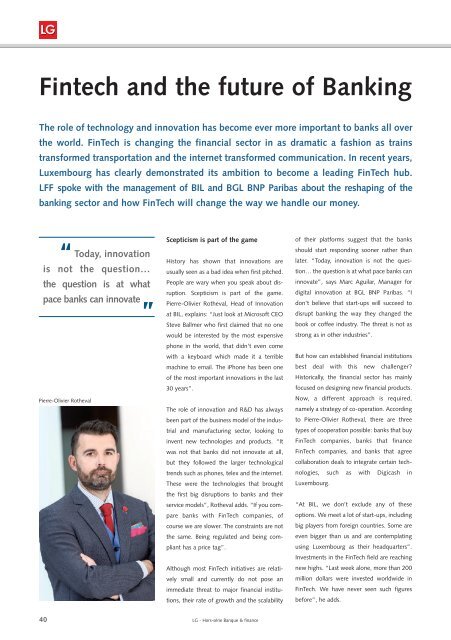Create successful ePaper yourself
Turn your PDF publications into a flip-book with our unique Google optimized e-Paper software.
Fintech and the future of Banking<br />
Marc Aguilar Romain Girst Hubert Musseau<br />
The role of technology and innovation has become ever more important to banks all over<br />
the world. FinTech is changing the financial sector in as dramatic a fashion as trains<br />
transformed transportation and the internet transformed communication. In recent years,<br />
Luxembourg has clearly demonstrated its ambition to become a leading FinTech hub.<br />
LFF spoke with the management of BIL and BGL BNP Paribas about the reshaping of the<br />
banking sector and how FinTech will change the way we handle our money.<br />
“<br />
Today, innovation<br />
is not the question…<br />
the question is at what<br />
pace banks can innovate<br />
Pierre-Olivier Rotheval<br />
”<br />
Scepticism is part of the game<br />
History has shown that innovations are<br />
usually seen as a bad idea when first pitched.<br />
People are wary when you speak about disruption.<br />
Scepticism is part of the game.<br />
Pierre-Olivier Rotheval, Head of Innovation<br />
at BIL, explains: “Just look at Microsoft CEO<br />
Steve Ballmer who first claimed that no one<br />
would be interested by the most expensive<br />
phone in the world, that didn’t even come<br />
with a keyboard which made it a terrible<br />
machine to email. The iPhone has been one<br />
of the most important innovations in the last<br />
30 years”.<br />
The role of innovation and R&D has always<br />
been part of the business model of the industrial<br />
and manufacturing sector, looking to<br />
invent new technologies and products. “It<br />
was not that banks did not innovate at all,<br />
but they followed the larger technological<br />
trends such as phones, telex and the internet.<br />
These were the technologies that brought<br />
the first big disruptions to banks and their<br />
service models”, Rotheval adds. “If you compare<br />
banks with FinTech companies, of<br />
course we are slower. The constraints are not<br />
the same. Being regulated and being compliant<br />
has a price tag”.<br />
Although most FinTech initiatives are relatively<br />
small and currently do not pose an<br />
immediate threat to major financial institutions,<br />
their rate of growth and the scalability<br />
of their platforms suggest that the banks<br />
should start responding sooner rather than<br />
later. “Today, innovation is not the question…<br />
the question is at what pace banks can<br />
innovate”, says Marc Aguilar, Manager for<br />
digital innovation at BGL BNP Paribas. “I<br />
don’t believe that start-ups will succeed to<br />
disrupt banking the way they changed the<br />
book or coffee industry. The threat is not as<br />
strong as in other industries”.<br />
But how can established financial institutions<br />
best deal with this new challenger?<br />
Historically, the financial sector has mainly<br />
focused on designing new financial products.<br />
Now, a different approach is required,<br />
namely a strategy of co-operation. According<br />
to Pierre-Olivier Rotheval, there are three<br />
types of cooperation possible: banks that buy<br />
FinTech companies, banks that <strong>finance</strong><br />
FinTech companies, and banks that agree<br />
collaboration deals to integrate certain technologies,<br />
such as with Digicash in<br />
Luxembourg.<br />
“At BIL, we don’t exclude any of these<br />
options. We meet a lot of start-ups, including<br />
big players from foreign countries. Some are<br />
even bigger than us and are contemplating<br />
using Luxembourg as their headquarters”.<br />
Investments in the FinTech field are reaching<br />
new highs. “Last week alone, more than 200<br />
million dollars were invested worldwide in<br />
FinTech. We have never seen such figures<br />
before”, he adds.<br />
Growing investments<br />
According to a new report by Accenture, global<br />
investment in FinTech ventures tripled<br />
from 4.05 bn USD in 2013 to 12.2 bn USD in<br />
2014, with Europe being the fastest growing<br />
region in the world. Last year FinTech investment<br />
increased at more than three times the<br />
rate of overall venture capital investment.<br />
While the United States still captures the lion’s<br />
share of FinTech investment, Europe experienced<br />
the highest growth rate with an increase<br />
of 215 percent to 1.48 bn USD in 2014.<br />
But what is exactly causing this growth? One<br />
of the reasons is that there has been an<br />
increase in financial technology funding<br />
making it one of the most popular markets<br />
for start-ups. In addition, banking firms are<br />
increasingly partnering with the industry.<br />
During the development stage, financial sector<br />
start-ups often encounter barriers.<br />
Through partnership with mature financial<br />
institutions, FinTech firms can access both<br />
growth capital and knowledge of critical<br />
industry issues, such as legislation and regulation.<br />
In turn, financial institutions can use the<br />
knowledge and intelligence gathered to make<br />
strategic choices and set future priorities.<br />
Openness to start-ups is beneficial to bank<br />
employees. “It opens up their mind. It is<br />
important to learn from the start-up culture,<br />
not only from their products. Bankers<br />
need to understand what it means to be a<br />
start-upper”, adds Rotheval. BGL BNP<br />
Paribas opened the lux future lab, providing<br />
office space, training, coaching and<br />
support for new entrepreneurial activity in<br />
Luxembourg. “If you want to keep pace<br />
with new technologies you have to<br />
approach innovation at an international<br />
level”, explains Marc Aguilar. “We bring an<br />
international network as well as consultancy<br />
to the start-ups”.<br />
The client<br />
The Luxembourg financial centre is by definition<br />
international. If Luxembourg banks<br />
want to grow, it needs to use digital channels<br />
to attract and serve new clients. “This would<br />
require acquisition channels that allow banks<br />
to get customers outside Luxembourg<br />
without the need for them to come physically<br />
to Luxembourg”, explains Romain<br />
Girst, Director Retail Banking at BGL BNP<br />
Paribas.<br />
What are the digital services that clients<br />
expect? “We need to be more client-centric.<br />
Customers want simple and efficient<br />
solutions. It must be easier to do or not to<br />
be done at all. Web-banking solutions for<br />
all the transactions and different devices.<br />
No one wants to be excluded because of<br />
their device”, adds Romain Girst.<br />
Speed is key. Especially young people want<br />
to be able to have an answer instantly.<br />
They barely make a phone call. “These instant<br />
answers can be provided via channels<br />
such as on-line banking but some clients<br />
also expect a relationship with their banks<br />
via Whatsapp or Facebook. The challenge<br />
is that these channels are interesting but<br />
we cannot rely on then without having the<br />
necessary security systems in place”, continues<br />
Pierre-Olivier Rotheval. “Most banks<br />
use legacy systems that are not real time<br />
systems. Clients want real time systems and<br />
immediate payments”.<br />
Small businesses also like to consolidate<br />
bank accounts with a provider that could<br />
reduce the time involved in the loan application<br />
process and provide more certainty<br />
of the outcome. One of the examples<br />
40<br />
LG - <strong>Hors</strong>-<strong>série</strong> <strong>Banque</strong> & <strong>finance</strong><br />
LG - <strong>Hors</strong>-<strong>série</strong> <strong>Banque</strong> & <strong>finance</strong><br />
41


















